World Federation of Public Health Associations has launched an initiative called “Global Public Health Week (GPHW)” from 4th -8th April, 2022. In response to the call of GPHW, the “Better Prepare for the Next Pandemic” Webinar, which organized by the WFPHA Asia Pacific Regional Liaison Office, co-organized by Chinese Preventive Medicine Association, Disease Control and Prevention Institute of Jinan University and CAST UN Consultative Committee on Life Science and Human Health (CCLH), was successfully held online on the afternoon of April 8. Liang Xiaofeng, the Vice President of CPMA, Governing Council member of WFPHA, Dean of Disease Control and Prevention Institute of Jinan University and the Vice President of CCLH was the host of this webinar.

Luis Eugenio de Souza, the Vice President of WFPHA
Luis Eugenio de Souza, the Vice President of WFPHA, said in his remark that the risk of the COVID-19 epidemic still exists, and we must take actions to prevent the next pandemic. It is hoped that countries around the world will strengthen cooperation between public health departments and strive to achieve equitable and accessible health services for all.
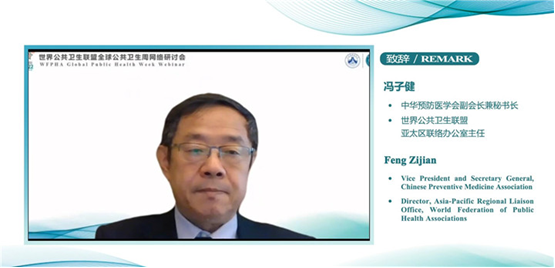
Feng Zijian, the Vice President and Secretary General of CPMA, Director of WFPHA Asia Pacific Regional Liaison Office, and Secretary General of CCLH
Feng Zijian, the Vice President and Secretary General of CPMA, Director of WFPHA Asia Pacific Regional Liaison Office, and Secretary General of CCLH, said in his speech that establishing herd immunity and protecting the people is an important part of China's anti-epidemic measures. He said that, “China actively promotes the spirit of solidarity and anti-epidemic, and devoted to promoting the construction of a community of common health for mankind. The WFPHA Asia-Pacific Regional Liaison Office will actively promote the concept of Global Health Week, continue to play the role of coordinator, and contribute to the development of public health in the region.”

Bettina Borisch, the Executive Director of WFPHA
Bettina Borisch, the Executive Director of WFPHA, believes that public health needs to take a longer-term perspective and must do the present work with a future perspective. She said that technical documents such as the International Health Regulations play an important role in preventing and effectively responding to possible future pandemics.
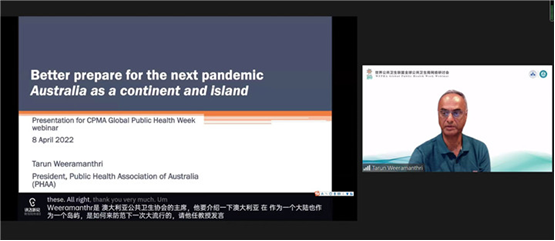
Tarun Weeramanthri, the President of PHAA
Tarun Weeramanthri, the President of the Public Health Association of Australia, said that Australia has achieved good overall results in epidemic prevention and control by creating new governance mechanisms and other measures. More investment is needed in public health and human resources in the future to better prepare for the next pandemic.

Zhou Lifeng, the Executive Councilor of PHANZ
Zhou Lifeng, the Executive Councilor of Public Health Association of New Zealand, shared the New Zealand's experience and lessons of epidemic prevention and control.
“New Zealand now has a traffic light system that shows the risk level of the pandemic in red, orange and green. We hope this will protect society, the economy and people's health.” He said that New Zealand is also undergoing the biggest reform of its health system in two decades.
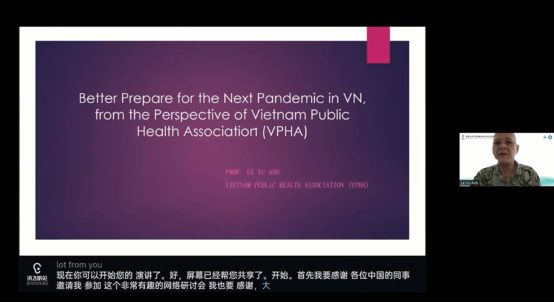
Le Vu Anh, the President of VPHA
Le Vu Anh, the President of Vietnam Public Health Association, introduced in detail the work carried out by the VPHA in the fight against the epidemic. Combining past experience and lessons in epidemic prevention, he summed up four suggestions. “First of all, Vietnam needs to improve the R&D and production capacity of vaccines. Second, it is necessary to make full use of the experience gained in implementing public health policies to better improve the construction of the primary health system. Third, Empowering Primary Care. Finally, more attention should be paid to public health research and human resources in the field of public health should be upskilled.”
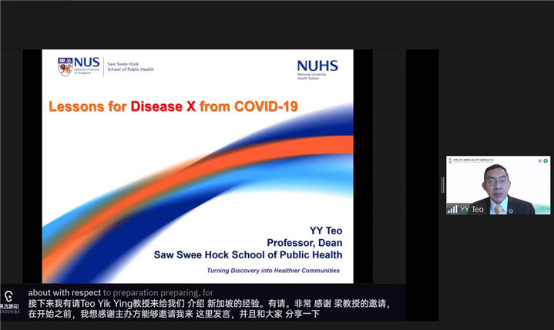
Teo Yik Ying, the Dean of School of Public Health, National University of Singapore
“The lesson Singapore has learned is that the ability to implement and carry out is very important.” Teo Yik Ying, the Dean of School of Public Health from National University of Singapore, introduced that law enforcement, punishment, and consistent, clear communication can help the public respond to the pandemic. At the same time, the investment in hardware infrastructure, the adjustment of people's mentality, and the cooperative ability of the community can also effectively deal with the next epidemic.
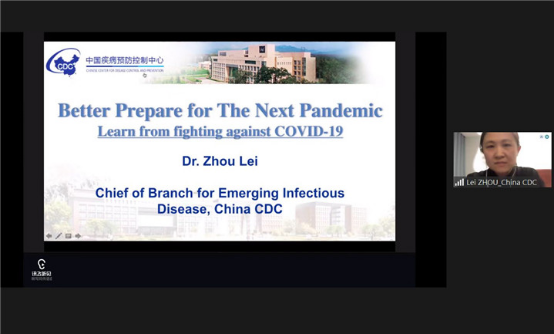
Zhou Lei, the Director of Department of Emerging Infectious Diseases and Diseases of Unknown Causes of Health Emergency Center, China CDC
Zhou Lei, the Director of Department of Emerging Infectious Diseases and Diseases of Unknown Causes of Health Emergency Center from China CDC said that coordination, cooperation and exchanges are the key experiences China has accumulated. China not only shared the epidemiological results with the international community, but also shared the accumulated experience and lessons. "Our goal is to build a shared future." She said that the prevention and control of the epidemic can be further improved in five aspects, "The first is to improve the construction of the public health system. The second is to strengthen the management and operation capacity of public health. The third is to consolidate the construction of public health-related technical and talent teams. The fourth is to maintain public intelligence and communication mechanisms, and the fifth is to deepen regional and global cooperation. "

Liang Xiaofeng, the Vice President of CPMA, Governing Council member of WFPHA, Dean of Disease Control and Prevention Institute of Jinan University and the Vice President of CCLH
Finally, Liang Xiaofeng pointed out that today's webinar is also one of the series of celebrations for World Health Day. The epidemic requires the global public health system to be better prepared. We need to maintain a scientific spirit and keep thinking deeply about best practices for the better preparing for the next pandemic. What’s more, he said that this webinar will be meaningful if it engenders deep thinking among professionals on the best practices. It is hoped that under the leadership of WHO and WFPHA, associations and institutions can continue to deepen cooperation and jointly embrace the dawn of victory in the future.
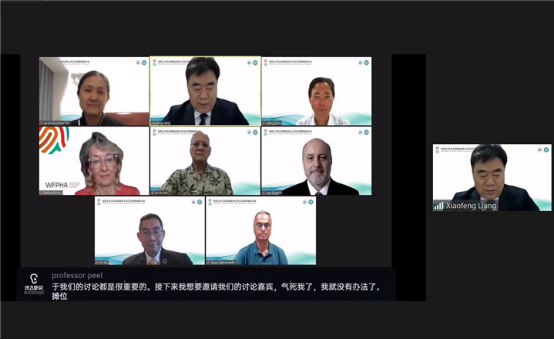
Panel Discussion
The World Federation of Public Health Associations was formally established in May 1967. The WFPHA is a non-governmental organization officially recognized by the World Health Organization, dedicated to promoting global health. Up to now, public health associations from 130 countries or regions have joined the Federation, and the Chinese Preventive Medicine Association officially joined in 1998.
During the COVID-19 epidemic, the Chinese Preventive Medicine Association and other WFPHA member associations which have been severely affected by the epidemic have exchanged experiences online many times. In addition, CPMA took the initiative to host the China Satellite Symposia of the 16th World Conference on Public Health, introduced China's public health measures to combat the COVID-19 pandemic, and shared China's prevention and control plan and diagnosis and treatment guidelines.
